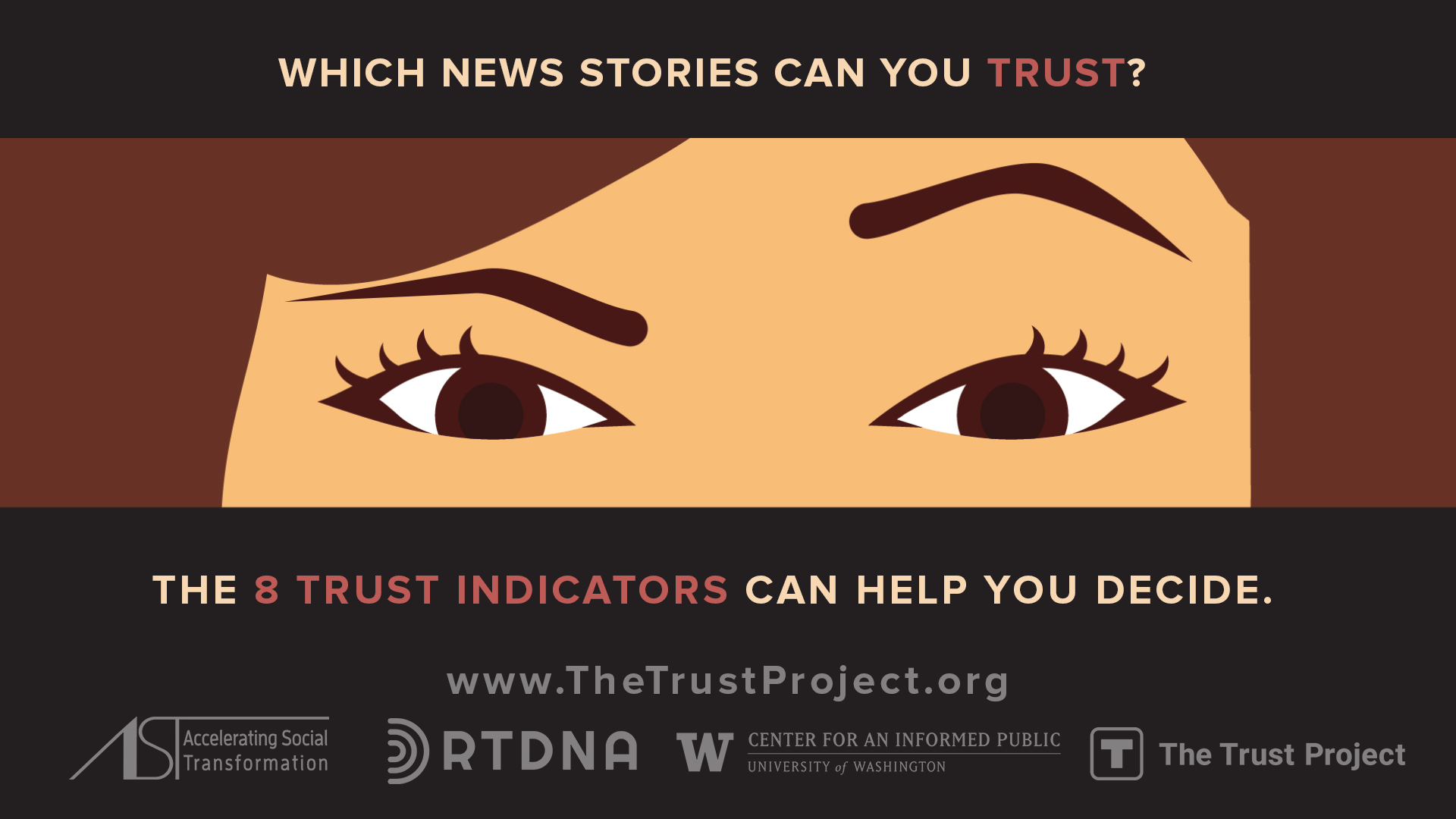SEATTLE (October 19, 2020) — The Trusted Journalism Partnership, a coalition of nonpartisan academic and media organizations, today launched a public information campaign focusing on people aged 65 and over, encouraging them to take a reflective pause and consider whether a news story is true or not before sharing it on social media.
The campaign is based on research at Princeton and New York universities analyzing people’s online behaviors in the final weeks of the 2016 elections:
- One quarter of all Americans visited a website masquerading as a legitimate news organization, but was in fact peddling false claims.
- The largest source of this internet traffic came from Facebook.
- While most people did not share the misleading information, Facebook users 65-and-over posted seven times as many articles from such websites, compared with adults under 29.
“We want to help people sort fact from fiction at a time when they are bombarded with disinformation,” said Dan Shelley, executive director and COO at the Radio Television Digital News Association, one of the participating organizations. “Our campaign is a critical reminder that fact-based journalism is different from other types of media. Legitimate news organizations hold themselves to high standards of transparency and accuracy. ”
The PSA campaign, which provides 15-, 30- and 90-second videos, highlights the Trust Project’s 8 Trust IndicatorsTM to help people evaluate the source of a news story and determine its validity.
“Our 8 Trust Indicators provide an easy checklist for making decisions about what news comes from reputable news organizations and what might be intentionally misleading or just plain wrong,” said Sally Lehrman, Trust Project founder and CEO, and a member of the Trusted Journalism Partnership.
To reach older Americans with its message, the Trusted Journalism Partnership is advertising on Facebook, the most popular social media platform among seniors.
“Technology has dramatically altered the way we consume information. But one thing has not changed: the difference between the truth and a lie,” said Akhtar Badshah, distinguished practitioner, University of Washington Evans School and founder of Accelerating Social Transformation. “We are giving people the tools to help them discern the difference.”
The campaign invites people to take three simple steps to support a healthy democracy: 1. Share the campaign, 2. Learn the Trust Indicators, 3. Sign a pledge to share only trusted journalism and curtail the spread of disinformation. The campaign includes a social media toolkit and a collection of resources.
To help spread the word about misinformation and the critical need for sharing trusted journalism, visit https://thetrustproject.org/trusted-journalism/share-campaign/.
###
Media Contact, RTDNA: Tara Puckey, Chief Staff Officer, Radio Television Digital News Association
Email: tarap@rtdna.org
Phone: (202) 868-9443
Media Contact, Center for an Informed Public: Michael Grass, Communications Manager, UW Center for an Informed Public
Email: megrass@uw.edu
Media Contact, Trust Project: Nettie Reynolds, Senior Director Communications, K8Communications
Email: nettie@k8communications.com
About the Trusted Journalism Partnership: The nonpartisan partnership includes Radio Television Digital News Association (RTDNA), The Trust Project, the Center for an Informed Public (CIP) at the University of Washington (UW) and UW’s Accelerating Social Transformation Program (AST). This project was incubated within Cascade Public Media‘s Hive Media Lab, in collaboration with campaign director Pamela Kilborn-Miller, Akhtar Badshah of UW Accelerating Social Transformation program, Jevin West of the CIP and the UW DataLab, and the Global Leadership Forum in Seattle. Funders include Microsoft’s Defending Democracy Program, The Trust Project, Facebook and the Peg and Rick Young Foundation. 4Site Interactive Studios in Washington, D.C. is providing creative services for the campaign.
About the Radio Television Digital News Association: The Radio Television Digital News Association (RTDNA) is the world’s largest professional organization devoted exclusively to broadcast and digital journalism. Founded as a grassroots organization in 1946, RTDNA’s mission is to promote and protect responsible journalism. RTDNA defends the First Amendment rights of electronic journalists throughout the country, honors outstanding work in the profession through the Edward R. Murrow Awards and provides members with training to encourage ethical standards, newsroom leadership and industry innovation.
About The Trust Project: The Trust Project is an international consortium of news organizations promoting the Trust Indicator standards of transparency and working with technology platforms to affirm and amplify journalism’s commitment to accuracy, inclusion and fairness so that the public can make informed news choices. It was founded and is led by award-winning journalist Sally Lehrman and more than 200 news sites now show the Trust Indicators on their pages.
About the UW Center for an Informed Public: The Center for an Informed Public (CIP) is a multidisciplinary research center at the University of Washington in Seattle with a mission to resist strategic misinformation, promote an informed society and strengthen democratic discourse. Established in 2019 in part through funding from the John S. and James L. Knight Foundation and the William and Flora Hewlett Foundation, the CIP has brought together world-class researchers, labs, thought leaders and practitioners to translate research about misinformation and disinformation into policy, technology design, curriculum development and public engagement.
About the Accelerating Social Transformation Program: The UW Accelerating Social Transformation Program (AST) provides unique, immersive experiences that drive social impact and spur innovation across sectors in support of the most vulnerable people in our society. Akhtar Badshah, the former head of Microsoft Philanthropies, helps students think broadly and deeply about major challenges facing social entrepreneurs. Students learn from industry influencers and leading-edge organizations about how to adapt to and embrace transformational change, as well as improve effectiveness across complex operating environments.



